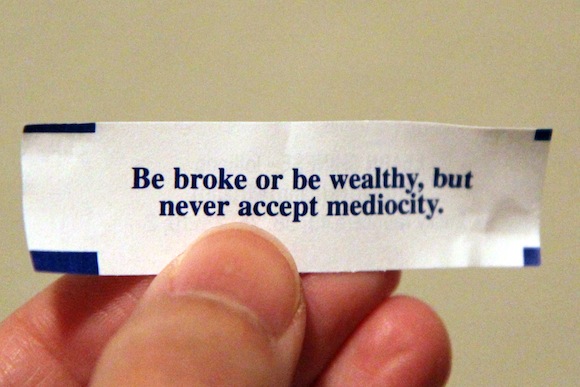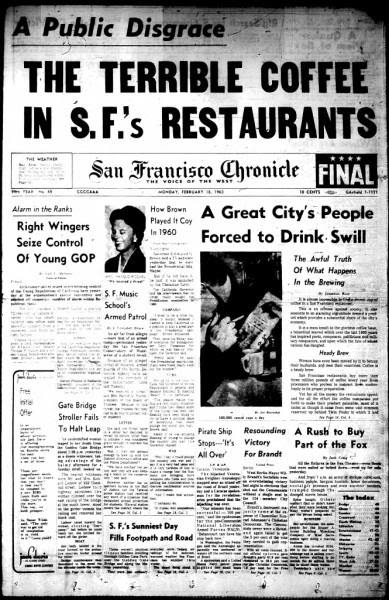LETTERS FROM THE GLOBAL PROVINCE
In Praise of Insignificance, Global Province Letter, 13 August 2014
“Most things which are urgent are not important,
and most things which are important are not urgent.” -- Dwight D Eisenhower
“Media, the plural of mediocrity.” -- Jimmy Breslin
“Forgive me my nonsense, as I also forgive the nonsense of those who think they talk sense.” -- Robert Frost
Our Plagiarism. We stole the nice title of this letter from blogger Jennifer Ouellette. She opines, “We are born narcissists, almost by definition, since we can only experience the world around us from our own perspective. In that sense, the world revolves around us, and no wonder the prospect of having our consciousness snuffed out unsettles us.
 “There was a very good reason people balked when confronted with scientific evidence to the contrary. Accepting Copernicus meant removing man from his place at the top of the cosmological food chain. “The world had scarcely become known as round and complete in itself when it was asked to waive the tremendous privilege of being the center of the universe,” Johann Wolfgang von Goethe later wrote of the implications of a heliocentric universe to 17th century believers. 'Never, perhaps, was a greater demand made on mankind.'”
“There was a very good reason people balked when confronted with scientific evidence to the contrary. Accepting Copernicus meant removing man from his place at the top of the cosmological food chain. “The world had scarcely become known as round and complete in itself when it was asked to waive the tremendous privilege of being the center of the universe,” Johann Wolfgang von Goethe later wrote of the implications of a heliocentric universe to 17th century believers. 'Never, perhaps, was a greater demand made on mankind.'”
Nonetheless, even with this understanding of our insignificance, she finds life riddled with meaning: “Nor does it make me feel like nothing I do could possibly matter. Quite the opposite: everything we do matters a great deal. That’s the paradox. It makes our short time here on Earth incredibly precious, in which every moment should be savored. I tell my husband I love him every single day, because those days are finite. Fifty years will be gone in an instant from a cosmological perspective. Our choices, our actions, how we choose to behave toward our fellow travelers — random kindness to strangers — all of this becomes tremendously important when one embraces insignificance… because this life is all we have.”
Cosmic Sifting. An intelligence that can separate the wheat from the chaff, recognizing that we and all that is about us are impregnated with insignificance, offers us sure footing and spiritual relief in an age suffused with puffery nourished by a media that breeds mediocity all about. Breslin got it right: our media—tv, cable, internet, radio, social networks—all of it is busy making mountains out of molehills and stuffing our heads with nonsense. Educator, cabinet secretary, and policy maker John Gardner got it right when he said we have a difficult task before us in a democracy where every utterance can be given equal credence and the quest for excellence can be dimmed by a mentality that treats every bleat as a symphony
In his first major work, Excellence: Can We Be Equal and Excellent Too?,Gardner challenges us to think, and look, and see acutely, rather than gobbling up the quaint notions espoused by the mediocre in our society: “The society which scorns excellence in plumbing as a humble activity and tolerates shoddiness in philosophy because it is an exalted activity will have neither good plumbing nor good philosophy: neither its pipes nor its theories will hold water.” Understand that mediocrity is our lot, but occasionally it is dotted with a few gems of excellence.
 Trivia Outwitted. It is this perspective that can best help us clean the trash out of our lives, be it at home or business. One can skim or not even read most of one’s email. We do not need a smart phone where the world of nonsense reaches us too easily. We can more or less turn the TV off, reclaiming hours for conversation, and family, and tending of the garden. We can absolutely turn the phone off between 6 and 9 o’clock when the survey companies, politicos, crass fundraisers, and other peddlers try to reach us. When you realize that much of what goes on around you does not count, you can make sure it is no longer counted. When we can get past the small stuff, we are taking our first steps out into the universe.
Trivia Outwitted. It is this perspective that can best help us clean the trash out of our lives, be it at home or business. One can skim or not even read most of one’s email. We do not need a smart phone where the world of nonsense reaches us too easily. We can more or less turn the TV off, reclaiming hours for conversation, and family, and tending of the garden. We can absolutely turn the phone off between 6 and 9 o’clock when the survey companies, politicos, crass fundraisers, and other peddlers try to reach us. When you realize that much of what goes on around you does not count, you can make sure it is no longer counted. When we can get past the small stuff, we are taking our first steps out into the universe.
There is plenty of jibber jabber to be shut down. To wit: “Every day were assaulted with facts, pseudofacts, news feeds and jibber-jabber, coming from all directions. According to a 2011 study, on a typical day, we take in the equivalent of about 174 newspapers worth of information, five times as much as we did in 1986. As the world’s 21,274 television stations produce some 85,000 hours of original programming every day (by 2003 figures), we watch an average of five hours of television per day. For every hour of YouTube video you watch, there are 5,999 hours of new video just posted!”
 The Sixties Reprised. Those of us who lived in the Berkeley, San Francisco, Silicon Valley orbit in the 1960s may have thought that Free Speech, silicon chips, topless bars, and Beat Poetry were fruitfully upsetting the world’s apple cart. The twenty somethings of that day thought they were at the center of the universe, all the while turning the world upside down. Truth is, twas fun but not all that important. It was so much fun then that a lighthearted editor (maybe Abe Mellinkoff) of the San Francisco Chronicle could put a banner headline on the paper one day, right on top of the first page, shouting “The Terrible Coffee in S.F.’s Restaurants” San Francisco has never been as much fun since, its commercial heart has declined, its housing is too expensive, and its newspapers now are truly a joke. The town amounted to something when it had a sense of the absurd, and its leaders secretly knew that it was a small pretty town where pedestrians could safely cross the street and nobody really deeply thought about the universe. A professor then remarked to us that there were some smart people at UC Berkeley and Stanford, but the trouble was that they had baked brains. It was a delightfully insignificant small spot on the globe.
The Sixties Reprised. Those of us who lived in the Berkeley, San Francisco, Silicon Valley orbit in the 1960s may have thought that Free Speech, silicon chips, topless bars, and Beat Poetry were fruitfully upsetting the world’s apple cart. The twenty somethings of that day thought they were at the center of the universe, all the while turning the world upside down. Truth is, twas fun but not all that important. It was so much fun then that a lighthearted editor (maybe Abe Mellinkoff) of the San Francisco Chronicle could put a banner headline on the paper one day, right on top of the first page, shouting “The Terrible Coffee in S.F.’s Restaurants” San Francisco has never been as much fun since, its commercial heart has declined, its housing is too expensive, and its newspapers now are truly a joke. The town amounted to something when it had a sense of the absurd, and its leaders secretly knew that it was a small pretty town where pedestrians could safely cross the street and nobody really deeply thought about the universe. A professor then remarked to us that there were some smart people at UC Berkeley and Stanford, but the trouble was that they had baked brains. It was a delightfully insignificant small spot on the globe.
Gresham’s Law. In the present age, we are pressed to winnow out the dreck because there is so much of it. If we cannot get it under control, it becomes impossible to dream big dreams and climb tall mountains. We’re meant to do better. Most simply expressed, the Law that best sums up our situation says “Bad money drives out good money.” But it also means bad ideas crowd out good ideas, sterile architecture and tar filled streets drive out beautiful hills and quiet homelives, loud mouths drown out civility, and so on. The important and the excellent only have a chance if we can put the mediocre aside, or at least laugh at it.
P.S. The Atlantic, a publication many of us had left for dead, has revived itself marvelously, proving that there is fire in the ashes, that the dearly departed can be revived. In a humorous video, it tries to tell us how to get control of email which infests our lives.
P.P.S. Back when the Wall Street Journal was still a newspaper, a fine journalist named Hal Lancaster asked three of us how a brush with death (i.e., a serious illness) had changed our lives. In our own case, we said it made us much less tolerant of B…. S…. and Mickey Mouse. Particularly in business we cast aside those who just wanted to jawbone and get nothing done. Life had become precious and short, and we did not want to waste moments on those who were running in place.
This reminds us of Mortality, a delightful and short account by Christopher Hitchens of his wrestle with cancer which all too soon brought him down. We emphasize short. Engagements with death make us into men with few words, economic in our style of communication, filling what moments we have with more meaning.
Home - About This Site - Contact Us
Copyright 2014 GlobalProvince.com